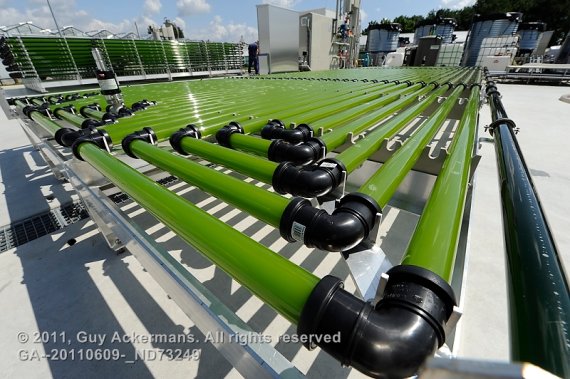Algae Parc, the pilot facility for algae research of Wageningen UR, it cost 3 million euro. In the past 5 years it was part of research projects worth 10 million euro on development of algae for the application in food, animal feed and biodiesel. Nineteen businesses including DSM, Unilever and BASF, worked together on improving and refining algae.
Five years ago the production of algae cost 6 euro per kilo, this has been halved, stated the scientific director Rene Wijffels of Algae Parc. This is due to the research of Wageninge. The international consortium succeeded in halving by better temperature manamgement in the algae reactor tubes, increased photosynthesis, increased productivity of the algae and tapping free CO2 sources, explains the director Maria Barbosa of Algae Parc. According to the sensitivity analysis the production costs can reduced even further to only 1 euro per kilo in the coming years.
The costs of the biorefinery also need to be added. The research centre has also made innovative steps on that ground. To extract the valuable materials out of the algae, the cell wall of the algae must be opened up. Research partner Dyadic has researched enzymes in Algae Parc that quickly breakdown the cell wall. An alternative approach is that the algae are ‘milked’, whereby the cell is kept intact. That approach also has process technological benefits.
Wijffels outlines three research priorities to make algae cultivation a competitive economic activity. This includes the development of high quality products based in algae. The professor in bioprocess technology is thinking of fish feed. The production of biodiesel from algae is not worthwhile for the time being, the most promising application lie in human food and livestock feed. The development of competitive algae products requires five to ten more years ofresearch, estimates Wijffels.
He would like to form another consortium with research institutions and businesses that will perform another five years of R&D at the research parc. But who will take the initiative? The Ministry of Economic Affairs, five years ago they were the base funder out of the FES programme, is now pointing to the top sector Biobased and the EU. And the EU is pointing at a research programme for a new biobasedproduction chains in Europe, where the industry is required to help pay. Nobody is taking the first step. It is now the task of the Algae Parc to set the stakeholders in motion. In the meantime the research is not stopped. The Wageningen Algae researchers are involved in three EU research programme that will continue in the coming years.

